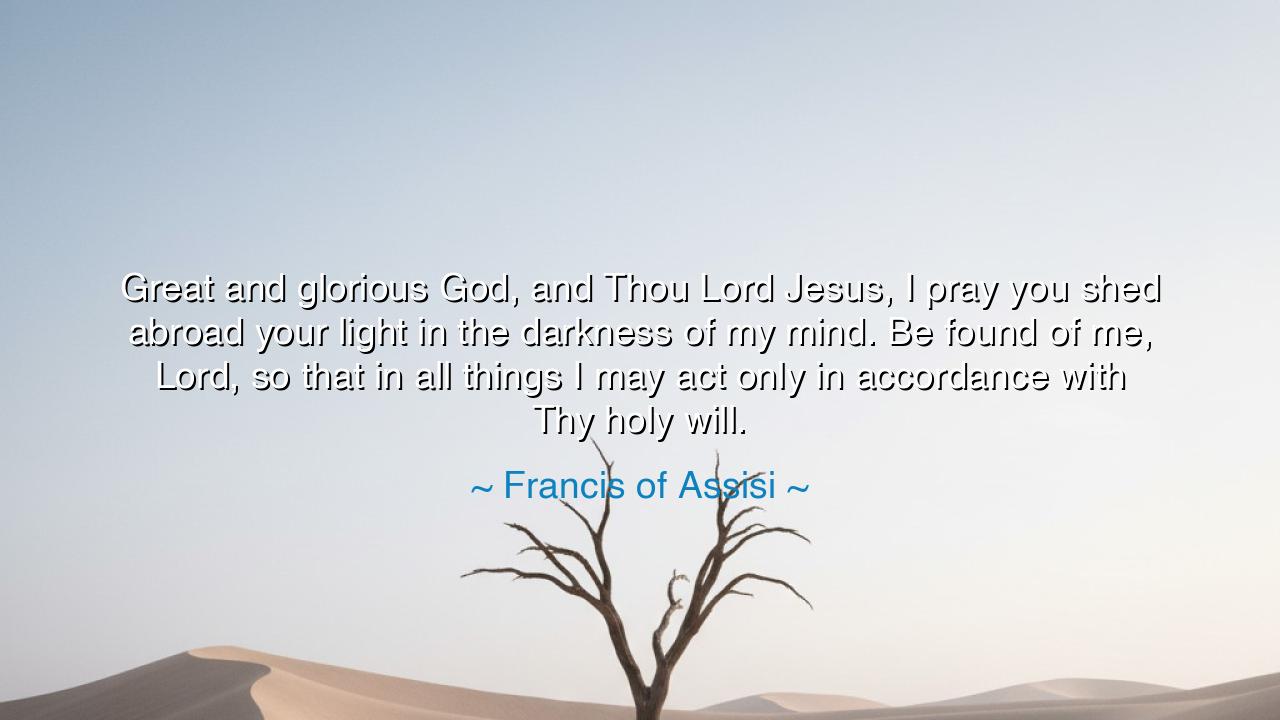
Great and glorious God, and Thou Lord Jesus, I pray you shed
Great and glorious God, and Thou Lord Jesus, I pray you shed abroad your light in the darkness of my mind. Be found of me, Lord, so that in all things I may act only in accordance with Thy holy will.






“Great and glorious God, and Thou Lord Jesus, I pray you shed abroad your light in the darkness of my mind. Be found of me, Lord, so that in all things I may act only in accordance with Thy holy will.” Thus prayed Francis of Assisi, the humble saint whose words were both a cry and a surrender—a plea not for power, but for illumination. In this simple yet profound supplication lies the essence of all true wisdom: the recognition that the mind of man, left to itself, is but a shadowed chamber, and that only the light of the divine can reveal the path of truth. This prayer, whispered in solitude centuries ago, continues to echo in the hearts of those who seek not just knowledge, but understanding born of the spirit.
The origin of this prayer lies in the heart of a man who renounced all earthly glory to walk barefoot upon the soil of humility. Francis of Assisi, born into wealth, turned away from comfort and inheritance to follow a voice greater than his own. His father clothed him in silk; he chose the coarse garment of the poor. His peers sought titles; he sought peace. His mind, like the minds of all who awaken, was once clouded with confusion—torn between the call of the world and the whisper of heaven. And so, in the silence of surrender, he uttered these words, beseeching God not to grant him wealth or wisdom as men count wisdom, but to shine light into his darkness and guide him toward divine purpose.
The ancients understood that the search for divine light is the highest quest of the soul. Plato spoke of the soul emerging from the cave of illusion into the sunlight of truth; the mystics of the East sought enlightenment as the dissolving of shadow into pure awareness. Francis, in his prayer, joined this eternal lineage of seekers. His darkness of mind was not ignorance alone—it was the murk of pride, fear, and human will. To ask God to be “found of me” is to confess the limits of one’s own sight and to yield to the divine vision that sees beyond the veils of self. Thus, Francis’s words are not merely a petition, but a transformation—the soul kneeling before its Maker and saying, “Not my will, but Thine.”
Consider, as a reflection of this truth, the story of Saul of Tarsus, who became Paul the Apostle. Once a man of learning and zeal, Saul pursued what he thought was righteousness, but it led him into blindness—both spiritual and literal. It was only when he was struck down on the road to Damascus and saw the heavenly light that his inner darkness was dispelled. In that moment of blinding radiance, Saul understood what Francis would later articulate in his prayer: that divine illumination comes not through mastery, but through surrender. To act “in accordance with Thy holy will” is the true victory of the soul—a conquest of pride and the awakening of clarity.
This prayer also reveals the paradox of faith—that light must often be sought in darkness, and that wisdom begins with humility. Many seek God in temples of grandeur, but Francis found Him in the leper’s face, in the whisper of the wind, in the cry of the poor. The light of God, he discovered, is not a beam that blinds but a flame that warms; it does not exalt the self, but dissolves it. To pray as Francis prayed is to allow that flame to enter the hidden corners of the heart, burning away the fog of selfish thought until what remains is a simple, radiant truth: to love and to serve as God wills.
In these words, there is also a practical path for all who walk the modern wilderness. When the mind is troubled, when decisions divide the spirit, pause as Francis did. Pray—not for success, not for the world’s approval, but for light. Say within yourself: “Let me see what is right, not what is easy. Let me act not from pride, but from purpose.” And when clarity comes, even faintly, follow it with courage. For divine guidance does not roar—it whispers. And only the still heart can hear it.
Thus, let this prayer of Francis be your companion through the seasons of confusion and striving. Remember that the darkness of mind is not a curse, but a call to seek the higher light. Every time you choose humility over arrogance, compassion over judgment, obedience over impulse—you fulfill the very essence of this prayer. For to act “in accordance with Thy holy will” is to align the fragile will of man with the eternal rhythm of creation.
And so, O seeker, take these words into your soul: the light you ask for is already rising. As Francis learned, the dawn of God’s truth does not burst upon the horizon in brilliance—it begins as a single ray piercing the night within. Nurture that ray with prayer, with love, and with service. In time, it shall become the sun of divine understanding, before which all darkness fades, and the mind, once clouded, becomes clear as the sky at morning.






AAdministratorAdministrator
Welcome, honored guests. Please leave a comment, we will respond soon